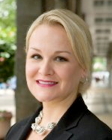Guest Opinion: Inspire girls to consider nontraditional careers

 Today, it’s easy to envision that young girls everywhere aspire to be whatever they want to be. Unfortunately, there are still many careers that aren’t traditionally considered by young women choosing their career paths, and there remain a number of male-dominated industries in our nation today.
Today, it’s easy to envision that young girls everywhere aspire to be whatever they want to be. Unfortunately, there are still many careers that aren’t traditionally considered by young women choosing their career paths, and there remain a number of male-dominated industries in our nation today.
This is why I was thrilled to come to the state of Iowa and join Lt. Gov. Kim Reynolds at two great events geared toward encouraging women to consider career paths in some of these nontraditional fields. First, we attended a STEM conference, hosted by the Iowa State University College of Science and Engineering and its Women in Science and Engineering program that encourages high school girls to consider STEM educations. Second, we attended a roundtable with central Iowa women leaders and business professionals that focused on the importance of mentoring young women to consider careers in these nontraditional industries.
At both of these events, I had the pleasure of sharing with these women the results of a yearlong study put together by my colleagues at the American Petroleum Institute. Specifically, this study examines the 1.9 million job opportunities that will be available in the oil and natural gas industry by 2035 and the fact that only 16 percent of these opportunities are projected to go to women. Because of this gap between men and women employed in the oil and natural gas industry, we conducted extensive research focused on finding why this gap existed and how we could engage more women to consider careers in oil and natural gas.
We conducted a comprehensive study, with quantitative and qualitative research, including in-person focus groups in six major U.S. cities, online focus groups and a national survey of 1,200 women.
As a result of this exhaustive research, we found women are holistic in searching for a career. Women first and foremost are looking for careers that offer good health care benefits, job security, job satisfaction, salary, and work/life balance. We also surveyed women employed by the oil and natural gas industry and found that those employed in this industry liked their job for these very same reasons.
We concluded that while the oil and natural gas industry has much of what women are looking for in careers, only 3 percent of women we polled had are applied for careers in this industry. When we delved deeper, our findings showed that women weren’t applying because they didn’t know about the variety of career options in the oil and natural gas industry, not that they weren’t interested.
These findings are not just true for the oil and natural gas industry, but also translate broadly across other industries that have not been traditionally considered by women.
This brought me on a nationwide tour to share these results with women and young girls from a variety of experiences and industries. It brought me to Iowa, alongside Lt. Gov. Reynolds, to share with women that there are opportunities in what may be considered nontraditional career paths. I was honored to work with Reynolds on these initiatives, as she has an extensive background advocating on behalf of STEM opportunities and empowering young women to pursue such opportunities and leadership roles.
At a breakfast hosted by the West Des Moines Chamber, Reynolds and I met with nearly 30 of Des Moines’ best and brightest female business leaders. These women were leaders in many walks of life, working in nonprofits, marketing, financial services, public office, energy, information technology and more.
These women are living, breathing examples that women can excel in careers in a wide array of industries and with backgrounds of all kinds. An informative conversation developed a clear consensus: Together we can encourage young women to pursue careers that provide them with what they are looking for, and that give them opportunities to step into leadership roles and grow.
We have a tremendous opportunity as leaders and as women to inspire the next generation of women to consider career paths across sectors that may be considered nontraditional, and by doing this we may just redefine what career paths are considered traditional for women of the future.
Tara Smith Anderson brings more than 15 years of public affairs, as well as state and federal government relations experience, to her role as director of external mobilization at the American Petroleum Institute (API). Anderson currently directs the development and execution of API’s mobilization campaigns on mission-critical issues at the federal, state and local levels. She also directs the trade association’s outreach and collaboration with women. Anderson holds a bachelor’s degree in political science with emphasis in media studies from the University of Oregon.
CONNECTION POINTS
Connect with Anderson on LinkedIn.








